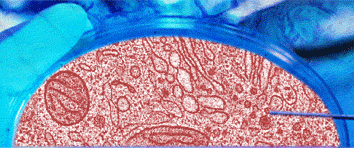 |
 |
 |
FCTI individually prepares for each patient (Autologous) Dendritic Cells and Dendritic Cell VaccinesImmunocytotherapy has increasingly been used in experimental and clinical oncology for patients unresponsive to the traditional treatment by surgery & irradiation & chemotherapy, or when such treatment had failed after the initial success. Oncologists have found the implantation of dendritic cells and dendritic cell vaccines the most useful among various tested types of immunocytotherapy. Fetal Cells Technologies International (FCTI) has been manufacturing autologous dendritic cells and autologous dendritic cell vaccines for implantation, along with autologous (and non-autologous) transfer factors. Click here for more information. Cancer derives from one (or just a few) normal cells that underwent malignant transformation, i.e. it is of monoclonal origin. Ever since 1950's it has been known that cancerous growth can stimulate immune response of the host. This was the basis of theory of immunosurveillance, proposed in early 1900's by P. Ehrlich and then developed by F. McFarlane Burnet (1960) and L. Thomas (1970), according to which the normal function of immune system is to recognize and destroy the cancerous cells, developing continuously by malignant transformation, before they can grow into tumors, or after they already formed tumors. Immunosurveillance for tumors is often ineffective, apparently because the immune responses to cancer are generally rather weak. The major effort of oncological immunology today is to find ways to augment the host immune response to cancer. Of the various weapons of the immune system CD8+ (cytolytic) T lymphocytes are considered the most effective: they provide the most potent anti-cancer immunity by recognizing and killing malignant cells that express peptides derived from mutant cellular or oncogenic viral proteins, presented in association with class I MHC complexes. But even when cancer cells that express peptide-class I MHC complexes are recognized by CD8+ T cells of the host, the activation of cytolytic T lymphocytes to carry out their task of killing cancer cells may still not take place. The main reasons are:
From the above came an idea to augment the weak host immune response to cancer by passive transfer of APC's, specifically dendritic cells, or of dendritic cell vaccines, and thereby multiply the quantity, and improve the performance, of the most important APC's, next to macrophages. The key function of dendritic cells is that of "presenting of antigen": binding of antigen, conversion of antigen protein to short peptides ("antigen processing"), and presentation of peptide-MHC complexes, expressed on the surface of each APC in a form that can be recognized by T lymphocytes, either by CD4+ helper cells or by CD8+ cytolytic T lymphocytes. Dendritic cells originate from the same bone marrow precursors as macrophages. Their spider-like shape, with multiple cytoplasmic projections ("dendrites"), makes their identification easy. The migrate, as "interdigitating dendritic cells" are found in the interstitium of most organs, as "veiled cells" are abundant in T cell-rich parts of spleen and lymph nodes, and as "Langerhans cells" are scattered throughout the epidermis. In blood dendritic cells represent 0.1% of all nucleated cells.
|
|
Home | Immune System | Dendritic Cells | Therapy | Cancer Vaccines | Dendritic Cells Preparation | Method of Treatment | DC Maturation Process | Contact
Copyright © FCTI 2024 All rights reserved. |



